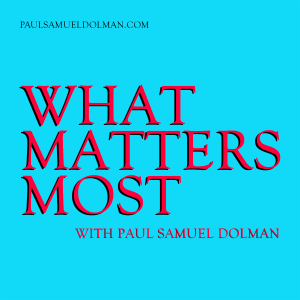
Katharine Hayhoe #473
Climate scientist Katharine Hayhoe joins host Paul Samuel Dolman on the What Matters Most podcast.

Climate scientist Katharine Hayhoe joins host Paul Samuel Dolman on the What Matters Most podcast.
For me the environment is the most critical issue we face as a species and a nation… what are we going to do about it and when? What are the facts and what do we face? In this compelling program we speak in depth with one of the world’s leading climate scientists, Katharine Hayhoe. Dr. Hayhoe is not only brilliant, but has a gift at making extremely complex situations, understood and intellectually accessible. She is also a devout Christian who sees a natural fit between spirituality and science.
In her own words…
I’m an atmospheric scientist. I study climate change, one of the most pressing issues we face today.
I don’t accept global warming on faith: I crunch the data, I analyze the models, I help engineers and city managers and ecologists quantify the impacts.
The data tells us the planet is warming; the science is clear that humans are responsible; the impacts we’re seeing today are already serious; and our future is in our hands. As John Holdren once said, “We basically have three choices: mitigation, adaptation, and suffering. We’re going to do some of each. The question is what the mix is going to be. The more mitigation we do, the less adaptation will be required, and the less suffering there will be.”
I began my career with a B.Sc. in physics and astronomy from the University of Toronto. My first published papers were in the field of observational astronomy, on variable stars and galaxy clustering around quasars. As I was finishing my degree, I took a class in climate science with Danny Harvey, who’d just returned from working at NCAR with Steve Schneider, and he blew my mind. I didn’t realize climate science was based on the exact same basic physics – thermodynamics, non-linear fluid dynamics, and radiative transfer – I’d been learning in astrophysics. And I definitely didn’t realize that climate change wasn’t just an environmental issue – it’s a threat multiplier.
It takes the most serious humanitarian issues confronting climate change today – hunger, poverty, lack of access to clean water, injustice, refugee crises and more – and it makes them worse. How could I not devote my time to helping fix this huge global challenge?
I switched gears and headed to the University of Illinois at Urbana-Champaign to work on a M.S. in atmospheric science with Don Wuebbles, a climate scientist well known for his leadership in policy-relevant science. Working with Don, my masters research focused on understanding human and natural sources of methane, and quantifying the contribution of methane and other non-CO2 greenhouse gases to emission reduction targets.
Get new episodes of What Matters Most automatically